{Top Hunting Dogs}
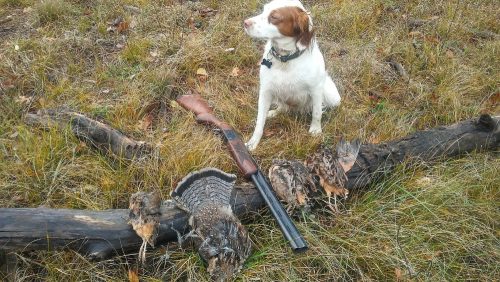
Owning a top hunting dog increases the chances of a fun and successful hunting endeavor. Top hunting dogs can be hard to find at times. The best dogs are a combination of breeding and training. No dog comes directly out of the womb knowing how to handle canny upland birds or feisty critters. Sure, breeding plays a huge role in finding a top hunting dog, but experience counts in the field. The only way to get experience is by experience.
Top hunting dogs are developed by using this philosophy, “Hard work beats talent, when talent doesn’t work hard.” Dogs are like people, they need practice. Everyday cannot be perfect. If you are not willing to take the time to have your dog practice his talents, you may never have the dog you desire. Many of the dogs we see advertised on Buy and Sell Hunting Dogs are those that have been trained to be started or finished dogs. Only you can decide whether you will buy a trained dog or find joy in training the dog yourself. Doing it yourself can create bonds that will last a lifetime between you and your animal. It takes time, if you do not have the time and want an elite hunting dog, find someone who is a good trainer with references.
To make a top hunting dog you need at least 20 – 40 minutes of practice per session each week. An optimum amount of sessions would be 2 or 3 per week. This keeps everything fresh, so both owner and companion don’t suffer from training burnout. The best dogs are developed by repetitious training. It is better to train in short bursts on a regular basis than to train your hunting dog for hours at a time one time per week.
Dogs who excel at their game are those who have desire. Having a strong wish to please, and have fun doing it, are the ingredients for success in all top hunting dogs. Breeding helps with desire, but having your dog maintain a desire to please comes from the two P’s: practice and praise. Positive reinforcement plays a huge part in creating desire.
Factors that promote success in making a top hunting dog:
- Practice
- Breeding
- Endurance
- Desire
- Positive Reinforcement
- Training collars
Notice that breeding was not at the top. Remember, “Hard work beats talent, when talent does not work hard.”
Making a Top Hunting Dog
Practice
Practice, practice, practice! Just like kids learning their ABC’s, dogs need that kind of repetitive training regiment so needed tasks are done effortlessly. Waiting until the day before hunting season to start working with your dog is a common mistake among many. You think Tom Brady starts practicing the day before football season starts? Heck no…. he starts months in advance. Some things you should be practicing with your gun dogs in the off season are: Pointing, backing, whoa, staying in range, retrieving and socializing. Not practicing these things ahead of schedule will create anything but a top hunting dog. Those who love hanging out with their dogs will see these things as fun and a delightful way to see your dog grow and bond with you. Those who do not enjoy these types of tasks should probably hire a qualified dog trainer to help with practice sessions.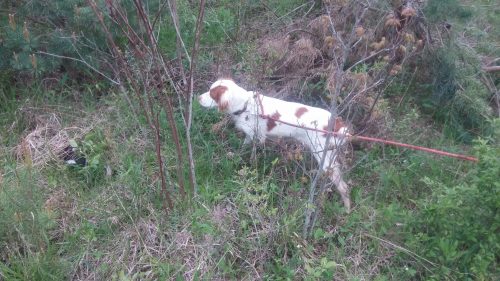
Breeding
You would not buy a pointing dog pup from a German Shepherd breeder, would you? No, of course not. Finding a reputable breeder that has dogs from hunting stock is crucial to your success. Having a pup whose parents have experience in the field is one of the keys to success. Can you purchase a pup from show dog breeding and practice, practice, practice and have it turn into a top hunting dog? Sure, but why make it harder than it must be. Find a breeder who has dogs who can find the game you seek. If possible, look at the parents, ask to see hunting photos of the dogs and look at the pedigree to see the linage of the pups. You be spending money and years of time with this pup. Weigh out the cost of an extra $100 bucks over the course of the next 10 years. Once you get a pup and the family starts getting fond of it, feelings may get hurt if you decide this pup is not going to work out in the field. Good starts make good finishes. If you want an elite hunting dog, go with the odds – get a reputable hunting dog breeder.
Endurance
Many dogs do great the first 30 minutes out. Top hunting dogs have the capacity to hunt for two – three hours at a time. This is usually enough. Not being 25 anymore this is enough for me as well. Once dogs started to get out of breath, they start sucking more air to just breathe, this makes it harder to smell game scent. You do not want your dog walking by your side, you want them out searching, seeking and finding. Pointing dogs tend to bump more birds when they are sucking air because they have a harder time gauging distance between them and the bird. Hounds have a harder time remaining on the scent when they are more worried about their next breath. Retrievers find more birds when they can smell where birds go down, or if they need to trail a wounded bird.
Find some way to make sure your dog gets the proper exercise they need to excel. Many use a pole on a four-wheeler and do a route. Golf courses where there are few people (sometimes in the morning or evening) are great places. If your dog is a runner make sure they have an E Collar, or they are good at coming when called. If you have a large yard let them roam freely. Play fetch, jog with them or take them out to the lake and let them play fetch in the water. Watch their diets. Top or elite dogs are usually the ones who can smell game at the end of the day walking back to the truck.
Bottom Line: You are responsible for your dog’s endurance.
Desire
Whoever really knows if top hunting dogs evolve because of nurture or nature. Maybe it comes from a little of both. How do we get a dog to have more desire? A few things come to mind. Positive reinforcement, practice, experience, confidence and endurance.
Praising your dog when he does well is paramount to helping develop an elite hunting dog. It does not matter whether you have a hound, pointing dog or retriever. Atta boy and Good Girl never get old. You do not have to overdo it, but good behavior needs to be recognized, as well as bad behavior needs negative reinforcement. Practice creates experience which creates confidence. These are things that will promote desire. Endurance will help keep the desire going at the end of the hunt when everyone is tired and ready to end the day. Worn out dogs lose desire faster than dogs who do not. Even if your dog has the desire, he may not have what it takes if he does not have endurance.
My best hunting buddy had a dog that would often go on point next to the car when we were quitting. The dog DID NOT want to quit, he had the desire to hunt and please. You can have the best-bred dog in the world, but if you cannot develop desire you may not be letting your dog live up to their true potential.
Positive Reinforcement
Ever work your butt off all day, do a great job and not have your boss acknowledge it? You did not like it did you? Positive reinforcement is one of the best training tools you can have. If you have a puppy start early. Let the dog know what you like and do not like. Do not make them guess. Nobody, dog or human, do well with mixed signals. Just ask your significant other.
Dogs thrive on affirmation that when they do well there is a reward. At times dogs need extra praise or petting. When they get in the field and they do what they are supposed to do they thrive on always doing the next right thing. When I take my Brittany out and she finds, points and retrieves the bird she is ecstatic. Once the excitement is over, she is back out looking all over again for the same rush. I get a rush from her rush. Positive reinforcement is the key to making the excitement and thrill last the entire day. Top hunting dogs are almost always ones who seek to please themselves and their owners.
Training Collars
Dogs need to be kept in check at times. Training collars are a means to do this in a measured way. It is great to be able to use these collars to get what you want a 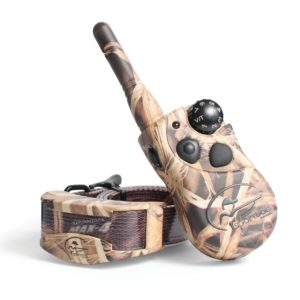 Finished Dog. Using a training collar in a responsible manner will help show your dog boundaries that they may need to perform at their potential. An out of control dog is one that can run in the road and get hit, one that may chase undesired prey or one that will not stay in range of where you need them to be. Find a reputable dealer that you can buy from. We sell many different types of training collars on our website, Buy and Sell Hunting Dogs. Find the right collar for you. Ask yourself some of these questions about what you will need the training collar for:
Finished Dog. Using a training collar in a responsible manner will help show your dog boundaries that they may need to perform at their potential. An out of control dog is one that can run in the road and get hit, one that may chase undesired prey or one that will not stay in range of where you need them to be. Find a reputable dealer that you can buy from. We sell many different types of training collars on our website, Buy and Sell Hunting Dogs. Find the right collar for you. Ask yourself some of these questions about what you will need the training collar for:
- How far do I need the range to go – 100, 200 or more yards from me.
- Does the collar have different settings?
- What sounds do the settings make?
- Can I adjust the sound from a handheld control?
- Do I have to continually get out the owner’s manual….is my device user friendly?
- Is my collar waterproof?
- Does it have a beeper that comes with it?
- Can I put a beeper on the training collar?
- Can I put a different color collar on the unit?
- Does the beeper have settings that I like…can I live with the hawk noise or am I better off listening to a beep?
- Can I adjust the beep to the mode I prefer?
- Am I better off putting the beeper/collar around my dogs’ neck or waist?
- Does it take batteries?
- How do I charge my training collar and handheld device?
Figure out your goal and then decide on what best fits YOUR needs. Like your puppy it is a task you want to think through and not just make a snap decision. To find a Top Hunting Dog go here.
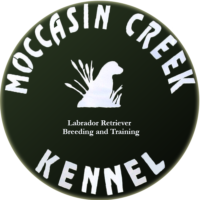
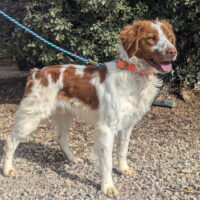
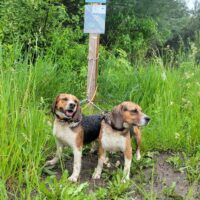
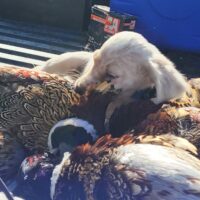
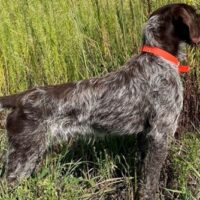
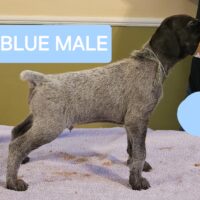
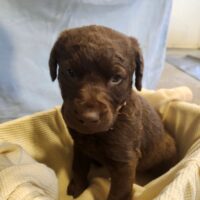
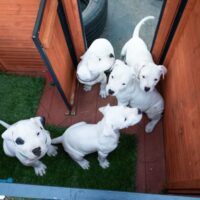
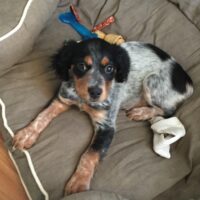
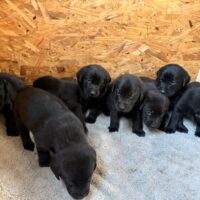

Speak Your Mind